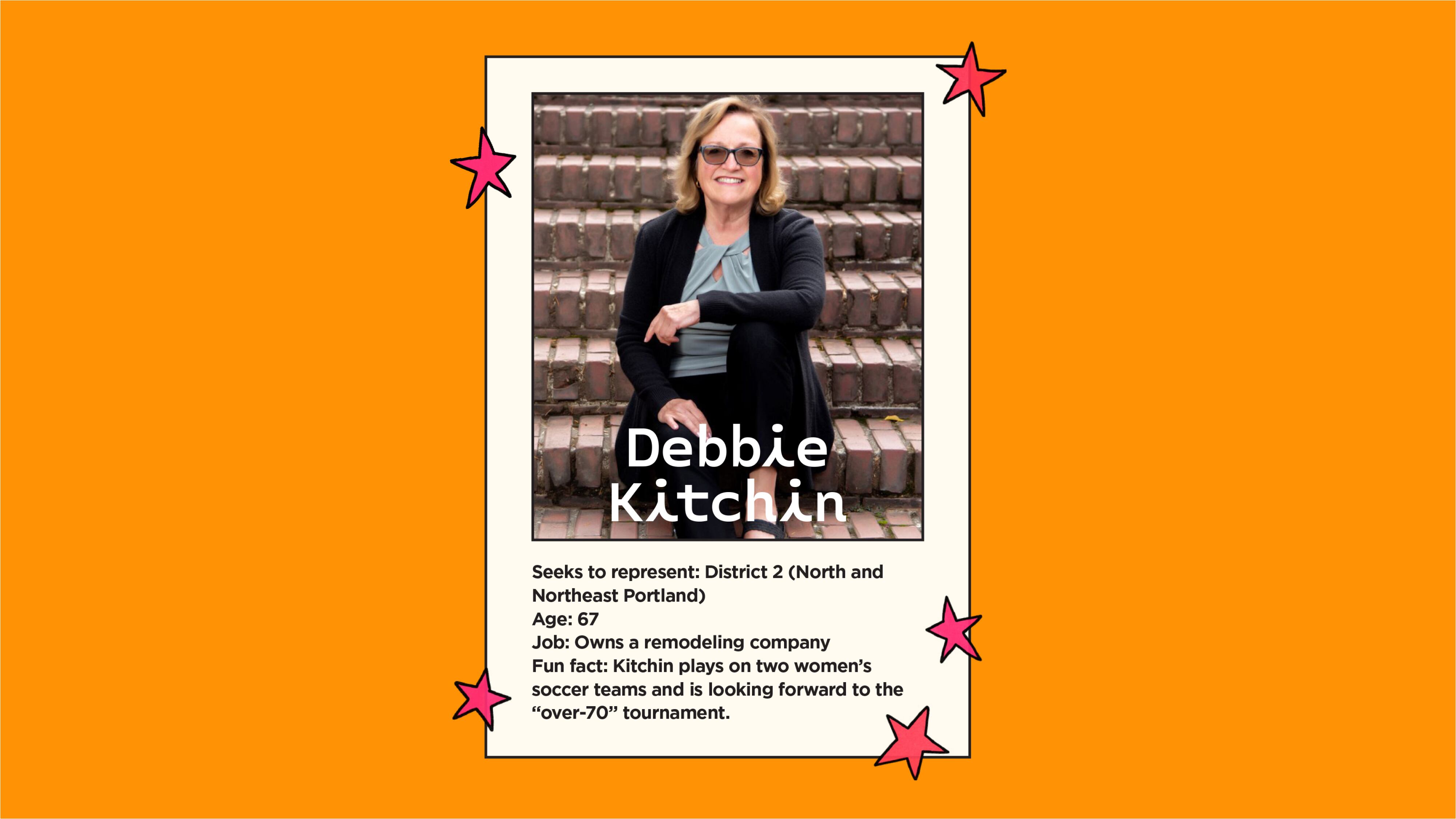- Seeks to represent: District 2 (North and Northeast Portland)
- Age: 67
- Job: Owns a remodeling company
- Fun fact: Kitchin plays on two women’s soccer teams and is looking forward to the “over-70″ tournament.
Debbie Kitchin has served on no shortage of boards and committees in her 48 years living in Portland. At one time or another, she has advised Prosper Portland, the Portland Metro Chamber, the security and cleanup district for the Central Eastside, and Portland Public Schools’ construction bond review committee.
But as she seeks a seat on the expanded, 12-member City Council, one line on Kitchin’s résumé is especially relevant. From 2020 to 2022, she served on the Portland Charter Commission, which proposed Measure 26-228, approved by voters in November 2022, to restructure city government and adopt ranked-choice voting for the city.
That means she’s running for a position in the government she helped craft.
Kitchin says she hasn’t received an unfair advantage—every candidate has access to the same information the commission used to design the system, and the biggest shift is changing councilors from executives to legislators.
“Most people I’ve talked with are very supportive of this change,” she says. “The concern I hear the most about is having a City Council that can work together and solve problems. There is a lot of frustration with how the city has been managed under the old system with the commission form of government.
This is Kitchin’s first bid for public office. A graduate of Reed College who received an MBA at Portland State University, she spent 15 years as a regional economist, first at the Bonneville Power Administration, then at the Northwest Power and Conservation Council. In 1994, she and her husband founded Interworks LLC, a general contractor renovating homes and commercial properties.
Kitchin spoke to WW by telephone. The interview has been lightly edited for brevity and clarity.
WW: What are your top three priorities if elected?
Debbie Kitchin: First, housing and homelessness. We’re never going to solve the homeless issue without more housing. We need more housing, more density, and we need to look at different types of zoning to create different types of housing, especially more low-income housing for the most vulnerable.
The other side of the equation of housing affordability is incomes. I am interested in working on our economic development to create enough prosperity for people to upskill into great jobs that are in the trades and advanced manufacturing, tech industry and health care.
Second, public safety. Everyone should feel safe in their community. I support Portland Street Response. We need to improve our emergency response times and continue our gun violence prevention programs, and we need safer streets for pedestrians and cyclists.
Third, climate resilience. We need to make sure that we are taking the actions we can to reduce our greenhouse gases and reduce our reliance on fossil fuels. Zoning changes to increase density are positive, and more tree canopy for shade and habitat.
Do you support the city staying in the Joint Office of Homeless Services? What’s your plan to address homelessness?
I do support having a joint office to address the issues. We need to have evidence-based approaches for working on the homeless issues, and we need to try to get the political egos out of the way. The clashes between the city and county can be resolved.
Would you change the Portland Clean Energy Fund and, if so, how?
This was passed by a huge majority of voters, and that is something that I give a great deal of credence to. It doesn’t mean that we can’t make some changes in the future. Addressing community disparities and being able to obtain climate resilience is very important, and I would not change that. There is a lot of potential and we need to continue.
What aspects of the city’s current approach to drug use and overdose deaths do you support and what would you change?
We need to look at what works for people to access services and recover. We need to look at possible federal funds that could be available. We are not providing enough treatment beds for people who are in need.
Other parts of the county that have lower housing costs are having similar drug issues. It just doesn’t happen in the open as much because people are in housing having those drug addiction issues.
Which current City Council member do you and your policies most align with?
Carmen Rubio. I’m very aligned with the work she’s doing on permitting, and I also just have a lot of respect for her, including the work that she did prior to being on City Council with the Latino Network.
I think she is good at implementing. I feel like sometimes politicians will pass some legislation and then walk away from it and say, “OK, we did that, it’s all done,” but really we haven’t done a good job of implementing programs. I think somebody who has implementation experience is valuable, and I would count myself in that realm.
See the other Portland City Council Candidates here!
 This article is part of Willamette Week’s Ballot Buddy, our special 2024 election coverage. Read more Ballot Buddy here.
This article is part of Willamette Week’s Ballot Buddy, our special 2024 election coverage. Read more Ballot Buddy here.
